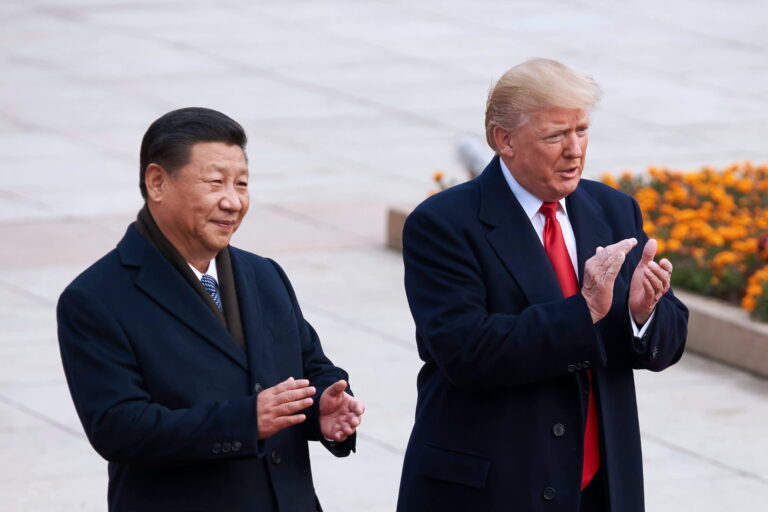Chinese President Xi Jinping and former U.S. President Donald Trump in Beijing in 2017.
Artyom Ivanov | TASS | Getty Images
“Exports are a big bright spot for the Chinese economy right now and policymakers want to be prepared,” Hui Xian, chief China economist at Goldman Sachs, said Tuesday on CNBC’s “Squawk Box Asia.”
“There’s talk of tariffs not just in the U.S. but also in China’s other major trading partners,” she said, “so this is not going to be a sustainable growth driver for China.”
The United States is China’s largest single trading partner, but the European Union trails Southeast Asia as China’s largest regional trading partner. President Trump raised tariffs on Chinese products during his presidency in 2018 and has threatened to raise them to 60% if re-elected this fall.
According to Citi, the contribution of goods exports to China’s real GDP growth in the second quarter of this year was the highest since the first quarter of 2022, when anti-COVID-19 restrictions limited domestic economic activity.
Meanwhile, Beijing is promoting the development of high-end manufacturing, but this has not yet fully offset the sluggish real estate market and sluggish consumption.
U.S. officials, including Treasury Secretary Janet Yellen, say China’s policies to increase its industrial power and technological independence are leading to job losses in the United States.
In his first interview since being selected as Trump’s running mate, Vance told Fox News that China, not the war in Ukraine, was the “real problem” and “biggest threat” to the United States.
The Biden campaign criticized Trump’s selection, saying the choice was made deliberately because “Vance will do what Mike Pence did not do on January 6th: He will do everything in his power to support Trump and his extreme MAGA agenda, even if it means breaking the law and whatever harm it may cause to the American people.”
Supporters of then-President Trump stormed the U.S. Capitol on January 6, 2021, in an attempt to overturn the results of the 2020 presidential election.
Asked about Vance’s comments, Chinese Foreign Ministry spokesman Lin Jian said at a regular press briefing on Tuesday that “we have always opposed making China an issue in the U.S. elections.”
China’s economy grew 4.7% in the second quarter from a year earlier, below economists’ expectations of a 5% expansion rate for the first half of the year, prompting calls for more stimulus for the world’s second-largest economy to reach 5% growth for the full year.
Goldman’s Shan said the downside risks from higher U.S. tariffs under the Trump administration would come mainly from increased uncertainty and tighter financial conditions, as well as pressure on the yuan, noting that the 2018 tariffs didn’t deal a big blow to Chinese exports to the U.S.
But recent data shows trade is slowing: Chinese exports to the US rose just 1.5% in the first half of this year.
“Policymakers need to think about domestic demand and focus on what is more sustainable and sustainable for the growth outlook,” Shan told CNBC on Tuesday.
If a 60% tariff were imposed, “I think that’s a pretty high tariff and the macroeconomic impact would be pretty significant,” she added.
So far, China has refrained from any stimulus measures. This week, China’s top leaders are due to meet in Beijing for a long-awaited third plenary session that is expected to determine the goals of long-term economic policy.
Citi analysts said on Monday that weak retail sales and disappointing second-quarter growth will not be enough to convince the Chinese government to step up support for the economy.
“Policymakers may be willing to tolerate short-term weakness amid structural changes in the real estate sector,” the analysts said. “Elevated trade and external relations concerns may give China policy room to maneuver in the future.”
Citi forecasts China’s real GDP growth to be 5.0% this year.
China’s dollar-denominated exports grew 3.6 percent in the first half of this year, as global demand for Chinese products beat expectations in recent months.
“Manufacturing and infrastructure investment will remain strong and exports should remain strong.” [year-on-year] growth [the third quarter]Ability to advance shipping orders [the second half of the year] “Fears of higher tariffs will likely cause the Chinese economy to slow,” Tao Wang, head of Asia economics and chief China economist at UBS Investment Bank, said in a note on Tuesday.
He said Chinese authorities are likely to be reluctant to implement any large-scale stimulus measures in coming months as they seek to conserve resources in case the economy weakens further or tariffs are raised.
UBS predicts that China’s economy will grow 4.9% this year.
But not all analysts believe a Trump presidency would be harmful to China.
Ben Harburg of CoreValues Alpha told CNBC on July 4 that China was likely to achieve “positive” trade outcomes under a Trump administration, given former President Trump’s “transactional nature.”
“He’s a professional negotiator and like any negotiator, he likes to set the bar low, set the price low and then work his way up from there,” the portfolio manager told Street Signs Asia.
Speaking about foreign policy, Harburg noted that if Biden is re-elected, tariffs will continue and there will be “intrusions into China’s domestic issues,” and neither the Chinese economy nor U.S.-China relations will see any significant improvement.
He said cooperation between Trump and China would mean “more dualistic possibilities for favorable outcomes for China.”
CNBC’s Sonia Heng contributed reporting from Singapore.

